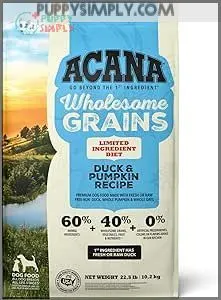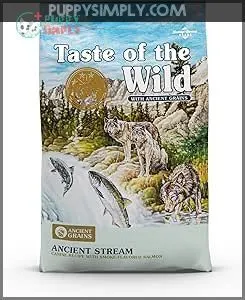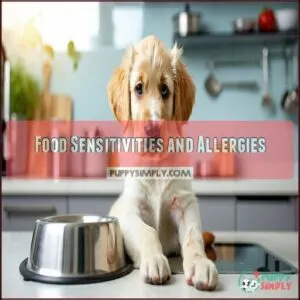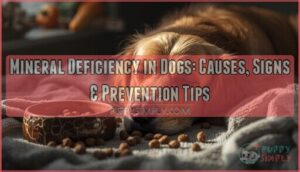This site is supported by our readers. We may earn a commission, at no cost to you, if you purchase through links.

Acana Duck and Pumpkin is a great pick, thanks to its single protein source and nutrient-packed ingredients like pumpkin for easy digestion. Another favorite is Taste of the Wild Salmon Ancient Grains, blending rich omega fatty acids with hearty grains like sorghum.
These options are perfect if your dog has allergies, a sensitive stomach, or if you’re aiming to avoid potential heart risks linked to legumes.
Curious about what makes these recipes shine? Keep reading to discover why they’re tail-wagging favorites!
Table Of Contents
- Key Takeaways
- The 2 Best Legume-Free Dog Foods
- Legume-Free Dog Food Benefits
- Risks of Legumes in Dog Food
- Choosing The Right Legume-Free Formula
- Frequently Asked Questions (FAQs)
- Is legume free good for dogs?
- Are lentils linked to DCM in dogs?
- Does acana dog food have legumes?
- Are grains or legumes better for dogs?
- What is a good dog food without legumes?
- What is a legume in dog food?
- Can dogs eat legumes?
- How much more expensive are legume-free dog foods?
- Are there any legume-free dog treat options?
- What are good alternative carbohydrate sources besides legumes?
- Conclusion
Key Takeaways
- Avoid potential heart risks and sensitive stomach issues by choosing legume-free dog foods like Acana Duck and Pumpkin or Taste of the Wild Salmon Ancient Grains.
- Opt for grain-inclusive options with ingredients like sweet potatoes, oats, and ancient grains for better digestion and balanced energy.
- Look for recipes with single-source proteins and probiotics to reduce allergy symptoms and improve skin, coat, and overall health.
- Consult your vet before switching to ensure you’re addressing your dog’s specific needs, from ingredient sensitivities to life stage nutrition.
The 2 Best Legume-Free Dog Foods
If you’re looking for the best legume-free dog food, choosing the right option can feel overwhelming.
We’ve picked two exceptional options, Acana Duck and Pumpkin and Taste of the Wild Salmon Ancient Grains, to make your decision easier.
1. Acana Duck and Pumpkin Dog Food

Packed with 60% animal ingredients and 40% wholesome grains, Acana Duck and Pumpkin Dog Food is perfect for sensitive tummies.
Packed with 60% animal ingredients and nutritious grains, Acana Duck and Pumpkin keeps sensitive tummies happy and nourished.
The single-source protein—duck—pairs with pumpkin, oats, and probiotics to support digestion and maintain a healthy weight.
Antioxidant-rich ingredients also boost your pup’s immunity, while a gluten-free formula excludes peas, corn, and soy, making it ideal for dogs with dietary restrictions.
A chicken allergy can cause digestive upset issues, making this a great alternative, especially for those seeking a high-quality dog food with noticeable benefits.
While slightly pricier, many pet owners rave about its quality and noticeable benefits, from shiny coats to better digestion, making it a worthwhile investment for pet owners seeking the best for their pets.
Best For: Dogs with sensitive digestion, dietary restrictions, or those who need a high-quality, limited-ingredient diet.
- High-quality duck protein with wholesome grains and pumpkin for digestion.
- Gluten-free, no peas, corn, or soy, suitable for sensitive stomachs.
- Improves coat condition, digestion, and overall health.
- Premium price compared to generic dog food brands.
- Not suitable for large breed puppies in the growth stage.
- Limited flavor options might not appeal to all dogs.
2. Taste Of The Wild Salmon Ancient Grains

Taste of the Wild Salmon Ancient Grains is a wholesome choice if you’re prioritizing nutrition for your dog.
Prioritize your pup’s health with Taste of the Wild Salmon Ancient Grains—nutrient-packed, high-protein, and perfect for sensitive stomachs!
Made with real salmon, it packs a protein punch (30%) while including ancient grains for balanced energy.
Omega fatty acids support skin and coat health, while probiotics and prebiotics aid digestion and immunity—a win for dogs with sensitive stomachs.
Plus, it’s free from chicken and common allergens, making it a trusted option for breeds of all sizes, with owners reporting shinier coats and healthier digestion.
Best For: Owners of dogs with sensitive stomachs, allergies, or those seeking a high-protein diet with digestive and immune support.
- Made with real salmon and high in protein (30%).
- Includes omega fatty acids for healthy skin and coat.
- Free from chicken and common allergens.
- More expensive compared to some other brands.
- Some dogs may need a gradual transition to avoid digestive issues.
- Not all dogs prefer ancient grains over the grain-free version.
Legume-Free Dog Food Benefits
Choosing legume-free dog food can support better digestion, reduce allergy risks, and promote heart health.
By skipping legumes, you’re providing a balanced diet that’s easier on your dog’s stomach and overall well-being.
Allergy Avoidance
Dogs prone to ingredient sensitivity often experience discomfort like itchy skin or chronic rashes. Dog food allergies can also lead to ear infections and upset stomachs.
Common triggers include legumes, which may compromise your dog’s skin health and coat quality. Switching to legume-free dog food can promote itch relief and improve overall comfort.
Novel protein diets can help alleviate allergic reactions.
Here are signs of food sensitivities to watch for:
- Itchy skin – Persistent scratching.
- Digestive distress – Vomiting or diarrhea.
- **Recurring ear infections.
- **Chronic rashes.
Sensitive Stomach
If your furry friend struggles with tummy troubles, a sensitive stomach dog food could help.
Packed with digestible grains, novel proteins, and no legumes, this type of dog food eases food sensitivities and promotes gut health.
Ingredients like Digestive Enzymes and probiotics provide Probiotic Benefits by supporting smooth digestion, while Limited Ingredients reduce risks of dog food allergies.
Gradual Introduction is key for sensitive pups to adjust comfortably to legume-free dog food options.
Heart Health
Protecting your pup’s heart means picking the right diet.
Legume-free dog food supports heart health by lowering DCM risk, especially in breeds prone to canine heart disease.
Grain inclusivity bolsters taurine levels, an amino acid essential for cardiac function.
Look for dog food ingredients like taurine-rich proteins, pumpkin, or omega-3s.
Smart supplementation options help safeguard your dog’s longevity and vitality.
Risks of Legumes in Dog Food
Feeding your dog food with legumes might seem harmless, but it could lead to food sensitivities or digestive problems.
Some studies even suggest a potential link between legumes and heart disease in dogs, so it’s worth paying attention to their diet.
Food Sensitivities and Allergies
If your pup battles skin allergies or frequent tummy troubles, food sensitivities could be to blame.
Legumes, a trigger for some dogs, might worsen dog food sensitivities, leading to ingredient intolerance or even chronic discomfort.
Switching to legume free dog food, featuring alternative protein sources, can ease issues like itchy skin or upset stomachs.
An elimination diet is a smart move to identify triggers, ensuring digestive health and better nutrition.
Always consult with your vet to match your dog’s needs while keeping them healthy and happy!
Digestive Issues
Gut health can be tricky, especially if legumes upset your dog’s digestion.
They may lead to bloating, diarrhea, or nutrient absorption problems linked to enzyme deficiency.
Choosing a legume-free dog food with options like sweet potato or oatmeal boosts the gut microbiome, easing food sensitivities and digestion issues.
For dogs with sensitive stomachs, these options pair well with probiotic benefits for overall digestive comfort.
Some dogs experience occasional vomiting symptoms, indicating a need for specialized food.
Potential Heart Disease Link
Worried about heart disease warnings in grain-free dog food? Let’s explore the DCM connection, a condition linked to diets high in legumes.
Research shows these foods may contribute to taurine deficiency, affecting heart health, especially in certain breeds. Here’s how:
- Taurine Deficiency: Legumes can lower taurine levels, essential for combating canine dilated cardiomyopathy (DCM).
- Nutrient Imbalance: Legumes might replace animal proteins essential for heart function.
- Grain-Free Debate: FDA cases spotlight legumes’ risks in grain-free dog food.
Ongoing research stresses switching to safe, legume free dog food for added protection.
Choosing The Right Legume-Free Formula
Picking the right legume-free dog food means thinking about your pup’s age, breed, and specific needs.
You’ll also want to check for healthy ingredients like whole grains or sweet potatoes and talk to your vet for extra guidance on finding the best fit for your dog, considering factors such as whole grains.
Age and Breed Considerations
Your dog’s age and breed size play a big role when picking the right legume-free dog food.
Puppies, especially large breeds, need puppy food with balanced calcium to support growing bones.
Active adults benefit from moderate-calorie meals with joint-friendly nutrients, especially large breeds needing extra mobility support.
Seniors, particularly small breeds, do better with senior dog food that’s easy to digest and lower in calories to maintain a healthy weight.
Choosing the right limited ingredient dog food suited to your dog’s stage and needs guarantees they stay energized, happy, and ready for whatever comes their way.
Alternative Carbohydrate Sources
Choosing the right legume-free dog food involves smart carbohydrate choices.
Luckily, several grain-free options offer balanced alternatives:
- Sweet Potatoes: Energizing and fiber-rich, they’re a great legume alternative.
- Tapioca Starch: A gentle binding agent supporting low-carb diets.
- Brown Rice or Oat Groats: Classic grains that aid digestion without peas or lentils.
Each option helps create grain-free, legume-free dog food that’s easier on sensitive stomachs and supports overall health.
These ingredients provide energy, but understanding carbohydrates is essential for a balanced diet.
Consulting Your Veterinarian
Switching to legume-free dog food? It’s smart to consult your veterinarian first.
They’ll assess your dog’s dietary needs, ensuring ingredient concerns or breed predispositions are addressed.
A veterinarian consultation also helps with:
- Allergy Testing to identify triggers.
- Recommendations for Food Trials suited to your pet’s health.
- Advice on meeting life stage Dog Health requirements.
Skipping this step could risk your dog’s well-being.
Trust a vet’s expertise to guide you toward pet food that nurtures ideal nutrition and long-term wellness.
Frequently Asked Questions (FAQs)
Is legume free good for dogs?
Legume-free dog food can be beneficial if your pup has allergies or sensitivities to legumes.
While legumes are nutritious, some dogs struggle to digest them.
Always consult your vet to confirm it’s the right choice.
Are lentils linked to DCM in dogs?
Some studies suggest lentils might be linked to canine dilated cardiomyopathy (DCM), but the connection isn’t fully understood.
Experts recommend balanced diets with diverse protein sources and consulting your vet before any major diet changes.
Does acana dog food have legumes?
You might be wondering if ACANA dog food contains legumes.
The answer is, it depends on the specific formula.
Some include lentils or peas, but others, like ACANA Singles + Wholesome Grains, avoid legumes entirely.
Are grains or legumes better for dogs?
Grains are often easier on a dog’s stomach and provide energy, while legumes supply protein and fiber.
Balance matters—choose what’s best for your dog’s needs, but consult your vet to make the right choice!
What is a good dog food without legumes?
Try ACANA Singles + Wholesome Grains for a balanced, legume-free option packed with quality proteins and simple ingredients.
It’s perfect if you want to keep your pup’s diet nutritious and easy on digestion.
What is a legume in dog food?
Imagine legumes as the peas, lentils, chickpeas, and beans in your dog’s bowl.
They’re used for protein or fiber, but some dogs struggle digesting them, leading to sensitivities or allergies.
Know your pup’s needs!
Can dogs eat legumes?
Yes, dogs can eat legumes like peas or lentils, as they’re a source of protein and fiber.
Just don’t overdo it—too many legumes might upset their stomach or interfere with nutrient absorption.
Balance is key!
How much more expensive are legume-free dog foods?
Legume-free dog foods typically cost 10-30% more than regular options due to higher-quality ingredients like meat proteins and whole grains.
The price hike reflects their focus on premium nutrition, making it worth considering for your pup’s health.
Are there any legume-free dog treat options?
Think of dog treats as little hugs for your pup.
Plenty of legume-free options exist, like Zuke’s Mini Naturals or Stella & Chewy’s treats.
Look for simple, wholesome ingredients to guarantee safe snacking.
What are good alternative carbohydrate sources besides legumes?
Good alternatives to legumes for carbohydrates in dog food include sweet potatoes, brown rice, oats, barley, and quinoa.
These ingredients provide energy, are easy to digest, and often suit dogs with sensitive stomachs.
Conclusion
Choosing the best legume-free dog food doesn’t have to be a challenge.
Options like Acana Duck and Pumpkin or Taste of the Wild Salmon Ancient Grains give your dog both great nutrition and tasty meals.
These recipes can help avoid allergies, aid digestion, and support heart health—all while skipping legumes.
Every dog is unique, so consider their age, breed, and specific needs.
Talk to your vet, and you’ll find a formula that’s perfect for your pup, ensuring they receive the best possible care for their overall well-being.
- https://www.fda.gov/animal-veterinary/outbreaks-and-advisories/fda-investigation-potential-link-between-certain-diets-and-canine-dilated-cardiomyopathy
- https://www.avma.org/javma-news/2021-01-01/fda-urges-collaboration-dilated-cardiomyopathy-afflicts-more-dogs
- https://pangovet.com/?utm_source=dogster&utm_medium=article&utm_campaign=dog-nutrition/
- https://olliepets.sjv.io/NkJn9P
- https://www.ncbi.nlm.nih.gov/pmc/articles/PMC6766488/













